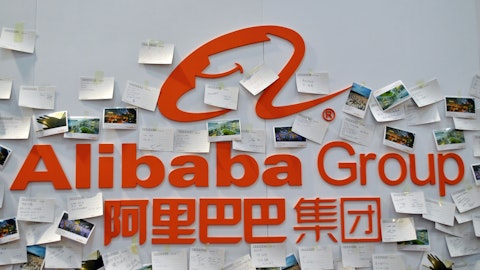In this article, we discuss the 5 Chinese stocks that could rebound in 2022 according to analysts. If you want our detailed analysis of the Chinese economy, go directly to Analysts Think These 10 Chinese Stocks Could Rebound in 2022.
5. Bilibili Inc. (NASDAQ:BILI)
Number of Hedge Fund Holders: 35
Bilibili Inc. (NASDAQ:BILI) is a Chinese company providing online entertainment in the form of content, videos, mobile games, and comics. The Shanghai-based Bilibili Inc. (NASDAQ:BILI) allows user generated content and live streaming on its platform as well. The stock fell approximately 75% in the last 12 months owing to the Chinese regulations on tech.
Binnie Wong of HSBC stated in March 2021 that Bilibili Inc. (NASDAQ:BILI) will “definitely” be able to reach its goal of doubling its user base by 2023. The analyst believes that Bilibili Inc. (NASDAQ:BILI) is one of the best self-driving and self-transformation stories from China, given revenue and user growth. The company offers ad platforms, commerce, video games, and online content, which makes it a significant internet play. The regulatory headwinds are tricky for Bilibili Inc. (NASDAQ:BILI), like many Chinese names, but the company has delivered on all its promises since its IPO. Bilibili Inc. (NASDAQ:BILI) is a multi-year story in the short video market and investors should look out for the stock.
On January 20, Citi analyst Brian Dapeng Gong lowered the price target on Bilibili Inc. (NASDAQ:BILI) to $61 from $120 and kept a Buy rating on the shares. The analyst expects Bilibili Inc. (NASDAQ:BILI)’s Q4 results to be largely in line with consensus.
As of Q3 2021, 35 hedge funds were long Bilibili Inc. (NASDAQ:BILI), down from 47 funds in the preceding quarter. Although elite hedge funds trimmed their stake in Bilibili Inc. (NASDAQ:BILI) in the third quarter due to the Chinese regulatory backdrop, billionaire Stephen Mandel’s Lone Pine Capital acquired a position in Bilibili Inc. (NASDAQ:BILI) in Q3, buying 8.6 million shares worth approximately $570 million.
Here is what Tao Value has to say about Bilibili Inc. (NASDAQ:BILI) in its Q3 2021 investor letter:
“As witnessed in the past quarter, the government intervention in the Chinese private sector is elevated to an unprecedented level. Given this background, I thoroughly reviewed all our Chinese holdings and made a few changes. We also exited Bilibili (ticker: BILI), given its priced-in valuation in the context of Chinese ADR confidence loss.”
4. Baidu, Inc. (NASDAQ:BIDU)
Number of Hedge Fund Holders: 44
Baidu, Inc. (NASDAQ:BIDU) is a Chinese multinational technology company that offers internet search services and expertise in artificial intelligence. Despite being one of the market leaders in tech, Baidu, Inc. (NASDAQ:BIDU) stock fell roughly 44% in the past 12 months due to increasing pressure from the Chinese authorities.
The People’s Bank of China announced a second interest rate cut in two straight months on January 19, whereas the Fed is looking at increasing rates in 2022. This helped with momentum in Chinese tech stocks like Baidu, Inc. (NASDAQ:BIDU), however, the Chinese market remains largely speculative due to uncertainty about regulations.
UBS analyst Wei Xiong raised the price target on Baidu, Inc. (NASDAQ:BIDU) to $230 from $220 and kept a Buy rating on the shares on January 12. Baidu, Inc. (NASDAQ:BIDU) has one of the best long-term risk/rewards while also making good progress in its car and cloud initiatives, which are aligned with government policies on technology innovation, but neither of these factors are priced into the stock, the analyst told investors in a research note.
Brendan Ahern, the chief investment officer at KraneShares, urged investors to be patient with Baidu, Inc. (NASDAQ:BIDU) as it develops its non-core businesses, and explained on November 18 that the technology investments at Baidu, Inc. (NASDAQ:BIDU) in terms of artificial intelligence may face less regulatory risks, since the internet giant understands the regulatory pressures and is investing more in AI, which is important for China’s growth in the decades to come.
In Q3 2021, 44 hedge funds were bullish on Baidu, Inc. (NASDAQ:BIDU) according to Insider Monkey’s database, with stakes equaling $2 billion. Ariel Investments, in the third quarter of 2021, increased its position in the company by 13%, holding 2.60 million shares worth roughly $400 million.
Here is what Ariel International & Ariel Global Fund has to say about Baidu, Inc. (NASDAQ:BIDU) in its Q3 2021 investor letter:
“When we have such a high level of conviction for a company it is not uncommon for us to own it in size across our portfolios. Such is the case with technology giant Baidu, whose leading search engine has been dubbed the “Google of China.” This quarter shares sold off in sympathy with the Chinese internet sector as investors were rattled by the government’s sweeping regulatory crackdown intended to promote “common prosperity” by easing wealth inequality. While we recognize the greater political risk of investing in emerging markets such as China and incorporate an appropriately higher risk premium in the discount rate in our valuation models, we believe Baidu’s business strategy is aligned with national policies and priorities and is therefore not adversely impacted unlike some other players in the internet sector who are in the eye of the storm.
Indeed, the Chinese government recognizes Baidu’s large, upfront investments in many next-generation artificial intelligence (AI) technologies and hails it as a national champion. For example, the company’s Advanced Driving Support System (ADAS), Apollo, has twice as much data on miles driven than any other initiative in the world, giving Baidu (and China) a large lead in the global AI arms race. In addition, Baidu’s cloud offering touts highly differentiated Platform as a Service (PaaS) features and capabilities for a demanding enterprise customer base. While these initiatives are a temporary drag on margins and require long-term execution, their success will bolster China’s “dual circulation” strategy aimed at spurring domestic demand, innovation and self-reliance.” (Click here to see the full text)
3. Pinduoduo Inc. (NASDAQ:PDD)
Number of Hedge Fund Holders: 49
Pinduoduo Inc. (NASDAQ:PDD) runs an ecommerce platform in China, offering apparel, accessories, food and beverage, fresh produce, electronic appliances, household goods, and other personal care items. Pinduoduo Inc. (NASDAQ:PDD) operates via a mobile application. Owing to regulatory concerns in China, Pinduoduo Inc. (NASDAQ:PDD) shares dipped roughly 70% in the last 12 months.
Although the performance of Pinduoduo Inc. (NASDAQ:PDD) has been impacted by China tightening its regulations on tech, Cathie Wood, founder of ARK Investment Management, is bullish on the stock heading into 2022, stating that she is buying Chinese tech that caters to multiple cities and primarily runs logistics services. She believes that China is here to stay for the long run, and the oversight on tech will settle since the government cannot risk total market collapse. As of Q4 2021, Wood’s fund holds 511,509 Pinduoduo Inc. (NASDAQ:PDD) shares, worth approximately $30 million.
On January 14, DBS Bank upgraded Pinduoduo Inc. (NASDAQ:PDD) to Buy from Hold with a $96 price target.
In the third quarter of 2021, 49 hedge funds were bullish on Pinduoduo Inc. (NASDAQ:PDD), with stakes equaling $3.5 billion. Tiger Global Management, a $52 billion Wall Street fund run by Chase Coleman, was the largest stakeholder of the company, with over 14 million shares worth $1.27 billion.
Here is what Baillie Gifford has to say about Pinduoduo Inc. (NASDAQ:PDD) in its Q2 2021 investor letter:
“As many countries enjoy a relaxation of Covid restrictions, Mr Market is focussed on short-term beneficiaries of ‘the pleasure after the plague’. There are interesting parallels with the Roaring 20s here, but to our minds, they extend beyond post-pandemic hedonism. Much of the new wealth created in the 1920s was patchily distributed and accompanied by a pervasive sense that the older generation had let down younger people. In 1920, John F. Carter, an irate 23-year-old wrote “the older generation had certainly pretty well ruined this world before passing it on to us. We have been forced to live in an atmosphere of ‘tomorrow we die,’ and so, naturally, we drank and were merry.”
In a similar vein, some of the greatest Growth opportunities are materialising from the companies that are shifting humankind towards more sustainable ways of consuming by driving efficiencies and eliminating surplus. Pinduoduo’s ‘farm to table’ platform is one example – cutting out huge waste in farm produce and short circuiting layers of infrastructure by matching Chinese food supply and demand through a group buying model. In a similar vein, Meituan is well on the way to developing China’s primary ‘Software as a Service’ ecosystem for food distribution which we believe has a strong chance of replacing wasteful wet markets as the primary channel for transacting in produce.
Pinduoduo’s share price pulled back following news that Chinese regulators are investigating possible anti-competitive activities by the country’s large online companies. However, Pinduoduo appears well placed to navigate such regulatory scrutiny in the long-term, helped in part by its community buying business model that benefits consumers, manufacturers and farmers alike. Its business fundamentals are stellar– the company remains the largest Chinese e-commerce platform, with over 820 million annual active users (surpassing Alibaba and JD.com), while revenue growth increased by 239% over the previous year.”
2. JD.com, Inc. (NASDAQ:JD)
Number of Hedge Fund Holders: 66
JD.com, Inc. (NASDAQ:JD) is an e-commerce company and retail infrastructure service provider based in China. The company was highly impacted by the Chinese regulations on tech, and the shares dropped almost 24% in the last 12 months.
Han Joon Kim of Macquarie in May 2021 stated that JD.com, Inc. (NASDAQ:JD) is expected to keep growing its user base and the company isn’t facing any major regulatory headwinds, since JD.com, Inc. (NASDAQ:JD) understands the Chinese tech requirements and is diversifying its asset composition in a way that its expertise helps the Chinese government. Additionally, China is loosening its money controls, and the lower interest rates, coupled with JD.com, Inc. (NASDAQ:JD)’s strong logistics and delivery infrastructure, is another reason the stock could rebound in 2022.
On January 26, JD Stifel analyst Scott Devitt lowered the price target on JD.com, Inc. (NASDAQ:JD) to $95 from $110 and kept a Buy rating on the shares as he previewed results for his China e-commerce coverage ahead of the December quarter reports from the group.
JD.com, Inc. (NASDAQ:JD) and Shopify Inc. (NYSE:SHOP) announced on January 18 that they “have come together to create a strategic partnership to give independent brands in the US a simple, trusted way to access consumers in China, while simultaneously enabling Shopify merchants worldwide to access JD’s quality supplier network”. The partnership links JD.com, Inc. (NASDAQ:JD)’s 550 million active customers in China to Shopify’s worldwide merchants. JD.com, Inc. (NASDAQ:JD) will open an accelerated channel for brands on Shopify to list products through JD Worldwide. This will also allow increased exposure to domestic Chinese brands.
In Q3 2021, 66 elite hedge funds were bullish on JD.com, Inc. (NASDAQ:JD), with stakes totaling $9 billion. Billionaire Daniel Sundheim’s D1 Capital Partners increased its stake in the Chinese e-commerce giant by 15% in Q3, holding a total of 17.7 million shares worth $1.28 billion.
Here is what Argosy Investors has to say about JD.com, Inc. (NASDAQ:JD) in its Q3 2021 investor letter:
“We sold JD as a result of the furor over Chinese stocks during the quarter. We had been concerned about China’s lack of respect for investor rights for some time, and Beijing has become significantly more aggressive in asserting itself of late. In addition, the legal structure Chinese companies use to come public in the U.S., a Cayman Islands shell corporation leaves American investors with an unsure path to recovering value should these companies cease to trade on U.S. exchanges. Because of the uncertainty, we exited our position in JD completely. We still love JD’s long-term prospects, but we cannot estimate the legal/regulatory risk associated with these companies anymore. More broadly, we are freeing up cash for some other positions we already own which have declined in this market, and after additional review, remain attractive.”
1. Alibaba Group Holding Limited (NYSE:BABA)
Number of Hedge Fund Holders: 115
Alibaba Group Holding Limited (NYSE:BABA) is one of the most well-known Chinese ecommerce retailers that suffered greatly at the hands of the Chinese tech crackdown. The company allows technology infrastructure and marketing reach to sellers from around the world.
Sam Le Cornu, the CEO and co-founder at Stonehorn Global Partners, announced on January 6 that his firm is buying more shares in Alibaba Group Holding Limited (NYSE:BABA). Cornu suggested that this is a buy opportunity given the company’s earnings outlook and valuation.
Truist analyst Youssef Squali on January 26 lowered the price target on Alibaba Group Holding Limited (NYSE:BABA) to $180 from $200 but kept a Buy rating on the shares as part of a broader research note on Internet and Digital Media. In the long-term, the analyst “remains impressed” by Alibaba Group Holding Limited (NYSE:BABA)’s “massive opportunity” in China and Southeast Asia.
115 hedge funds in the third quarter of 2021 were bullish on Alibaba Group Holding Limited (NYSE:BABA), with stakes totaling $10.2 billion. Fisher Asset Management increased its position in Alibaba Group Holding Limited (NYSE:BABA) in Q3 2021 by 1%, holding 14.2 million shares worth $2.1 billion. Billionaire Charlie Munger’s Daily Journal Corp also elevated its position in Alibaba Group Holding Limited (NYSE:BABA) in Q3, holding over 600,000 shares worth $71.5 million. Munger’s endorsement of the stock also eased the paranoia of investors regarding the Chinese tech giant.
Here is what Aikya has to say about Alibaba Group Holding Limited (NYSE:BABA) in its Q4 2021 investor letter:
“Most investors looking to invest in high quality and sustainable businesses in Emerging Markets start their assessment by analyzing the franchise and the financial statements – but often miss the risks associated with questionable stewardship. For example:
Alibaba was widely understood to be a high-quality and sustainable company, with the appearance of a business that empowered SME merchants while generally contributing to technology and financial infrastructure in China. Its dominant e-commerce franchise delivered healthy ROEs for several years, to the contentment of investors. We believe that the competitive advantage was explained mostly by the management’s early links to the Shanghai faction of the CCP. As the political winds have changed, the business has proven to be less resilient than first perceived.”
You can also take a look at 15 Worst Stock Picks of Cathie Wood and 9 Stocks That Credit Markets Expert Steve Ketchum Likes.





